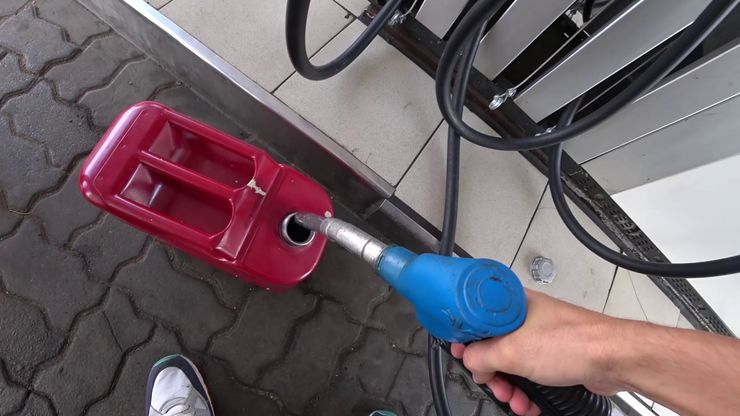Why is the price of gasoline soaring due to falling oil prices in Russia?
- January 12, 2023
- 0
In the near future, Russian motorists will be able to fully experience all the “charms” of low fuel prices in the world, faced with rising prices at gas
In the near future, Russian motorists will be able to fully experience all the “charms” of low fuel prices in the world, faced with rising prices at gas

Cheaper oil in the world threatens to cost the Russians dearly. The trend “eats” the profits of domestic exporters. The Brent variety, which everyone is guided by, now costs about $ 75 a barrel on the world market. Because of the sanctions, all sorts of Indians with the Chinese buy Russian-quality Urals at a discount to this level in the amount of 25-30 dollars. That is, 45-50 “American tugriks” per barrel. And some experts say that even cheaper – for 37-40 dollars! As a result, less money will enter the Russian budget. It’s trite. But the described problem also has a “second bottom” associated with oil refining products – gasoline and diesel fuel. It is called “oil damper”.
To a normal person, this expression means little. But such a fiscal mechanism hits the wallet of every car owner in the most direct way. The authorities organized it in 2019, when high fuel prices in Europe drove up the price tags at Russian gas stations. Domestic merchants were simply not interested in selling fuel on the Russian market. To compensate for such imbalances, the government came up with the “depmfer”. It comes down to the following. When motor fuel export prices are kept higher than those in Russia, the country’s budget partly compensates oil companies for lost profits from fuel sales at domestic filling stations.
If foreign prices are lower than ours, the owners of domestic refineries pay part of this difference to the state. The trick is that since the creation of the “damper” and until recently, imports of petroleum products have been more profitable than supplies to the domestic market. And the state budget regularly paid domestic oil refiners. But now the price of Russian oil and oil products is steadily falling on the world market. And here too, the European Union introduces an embargo on their purchase. In general, in December 2022, oilmen paid money to the budget for the first time as part of the “damper”. And furthermore, they will apparently have to transfer such installments on a regular basis.
And this is an additional cost. And how is it customary to act in such cases in the domestic oil industry? That’s right: we urgently need to raise retail prices at gas stations across the country! To keep their profit at the expense of an ordinary car owner. It is believed that there is an unspoken agreement between the Russian oil oligarchs and the authorities: retail fuel prices can only rise in the context of inflation. But after all, they are informal agreements, so they can always be adapted ‘to the present moment’. So that all the wolves are fed, and the citizens-motorists – let them somehow cope with the high price tags at gas stations.

Cheaper oil in the world threatens to cost the Russians dearly. The trend “eats” the profits of domestic exporters. The Brent variety, which everyone is guided by, now costs about $ 75 a barrel on the world market. Due to the sanctions, all sorts of Indians with the Chinese buy the Urals of Russian quality at a discount to this level in the amount of 25-30 dollars. That is, 45-50 “American tugriks” per barrel. And some experts say that even cheaper – for 37-40 dollars! As a result, less money will enter the Russian budget. It’s trite. But the described problem also has a “second bottom” associated with oil refining products – gasoline and diesel fuel. It is called “oil damper”.
To a normal person, this expression means little. But such a fiscal mechanism hits the wallet of every car owner in the most direct way. The authorities organized it in 2019, when high fuel prices in Europe drove up the price tags at Russian gas stations. Domestic merchants were simply not interested in selling fuel on the Russian market. To compensate for such imbalances, the government came up with the “depmfer”. It comes down to the following. When motor fuel export prices are kept higher than those in Russia, the country’s budget partially compensates oil companies for lost profits from fuel sales at domestic filling stations.
If foreign prices are lower than ours, the owners of domestic refineries pay part of this difference to the state. The trick is that since the creation of the “damper” and until recently, imports of petroleum products have been more profitable than supplies to the domestic market. And the state budget regularly paid domestic oil refiners. But now the price of Russian oil and oil products is steadily falling on the world market. And here too, the European Union introduces an embargo on their purchase. In general, in December 2022, oilmen paid money to the budget for the first time as part of the “damper”. And furthermore, they will apparently have to transfer such installments on a regular basis.
And this is an additional cost. And how is it customary to act in such cases in the domestic oil industry? That’s right: we urgently need to raise retail prices at gas stations across the country! To keep their profit at the expense of an ordinary car owner. It is believed that there is an unspoken agreement between the Russian oil oligarchs and the authorities: retail fuel prices can only rise in the context of inflation. But after all, they are informal agreements, so they can always be adapted ‘to the present moment’. So that all the wolves are fed, and the citizens-motorists – let them somehow cope with the high price tags at gas stations.
Source: Avto Vzglyad
Donald Salinas is an experienced automobile journalist and writer for Div Bracket. He brings his readers the latest news and developments from the world of automobiles, offering a unique and knowledgeable perspective on the latest trends and innovations in the automotive industry.